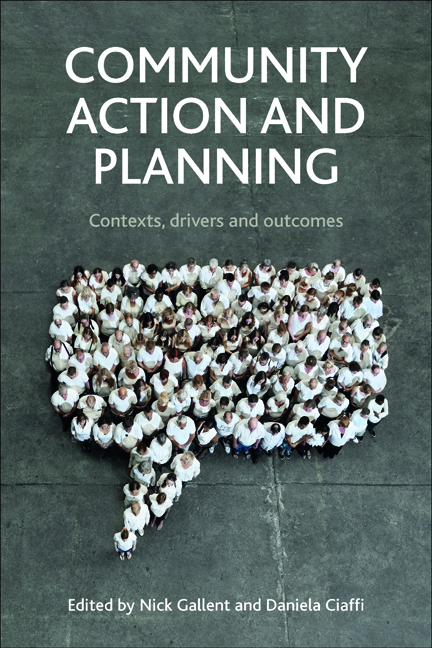Part 2 - Contexts and drivers for community action
Published online by Cambridge University Press: 04 March 2022
Summary
The first series of case-study based chapters focus on the contexts in which community action takes root, and the drivers which push it towards particular goals. These chapters explore four different contexts: the role of neighbourhood associations in Spain in negotiating the transition to democracy in the 1970s, and the way they subsequently played a major role in Spanish politics and the determination of public policy agendas; community support triggered by crisis in farming and fishing communities in rural Australia; the extremely challenging socioeconomic environment for community ‘empowerment’ in Marseille; and an island community in Scotland using the acquisition of land as a platform for community development.
The emergence of community action from these very diverse contexts reveals that such action can be triggered in a number of ways. Vilà shows clearly, in Chapter 4, that a lack of national democracy provides a fertile context for the growth of local action as people seek to take greater control of their lives and their neighbourhoods. The Spanish example illustrates the effects of a very extreme form of democratic deficit and also the way in which local groups seek to counterbalance the power of the state even when representative government appears to have addressed that deficit. In a very different environment, Kilpatrick, Willis and Lewis focus on the self-help benefits of communities that ‘pull together’ in what they refer to as ‘difficult times’. In the deeply rural context examined in Chapter 5, it was never likely that state services were going to be able to address the health challenges – physical and psychological – of remoter communities given their limited resources. Therefore, these communities were left to develop soft services through existing social networks, relying on their existing store of social capital, and on its expansion through the building of new links with private sector partners. The real context here is one of socio-economic crisis, leading to a clear community response. The case of Marseille shares some similarities with Barcelona 50 years ago. Messaoudène, Pinson and Berra show very vividly how local residents struggle to exert their rights in the context of a tradition of interventionist government, which arguably views communities – and the broader idea of ‘community’ – as a threat to statehood, attempting to iron out local difference rather than celebrating it.
- Type
- Chapter
- Information
- Community Action and PlanningContexts, Drivers and Outcomes, pp. 57 - 58Publisher: Bristol University PressPrint publication year: 2014



